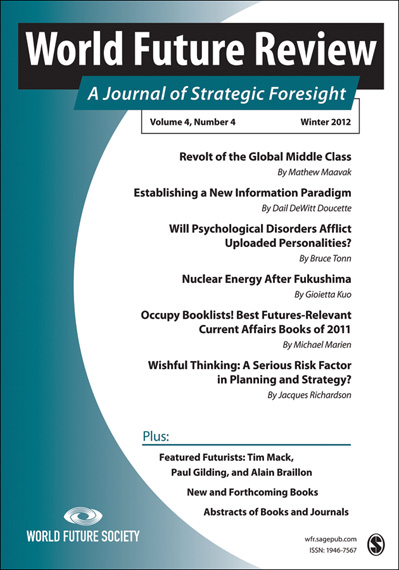Introducing the New Editor of World Future Review!
We’re pleased to welcome the new editor of World Future Review, James Allen Dator! Jim Dator graciously provided us with some information on his background:
James Allen Dator is Professor Emeritus and former Director of the Hawaii Research Center for Futures Studies, Department of Political Science, and Adjunct Professor in the College of Architecture, of the University of Hawaii at Manoa; Co-Chair and Core Lecturer, Space Humanities, International Space
University, Strasbourg, France; Adjunct Professor, Graduate School of Futures Strategy, Korean Advanced Institute of Science and Technology; Daejeon, Korea, and former President, World Futures Studies Federation. He recently became editor in chief of the World Future Review. He also taught at Rikkyo University (Tokyo, for six years), the University of Maryland, Virginia Tech, the University of Toronto, and the InterUniversity Consortium for Postgraduate Studies in Dubrovnik, Yugoslavia.
He received a BA in Ancient and Medieval History and Philosophy from Stetson University, an MA in Political Science from the University of Pennsylvania, and a PhD in Political Science from The American University. He did post-graduate work at Virginia Theological Seminary (Ethics and Church History), Yale University (Japanese Language), The University of Michigan (Linguistics and Quantitative Methods), Southern Methodist University (Mathematical Applications in Political Science).
He is a Danforth Fellow, Woodrow Wilson Fellow, and Fulbright Fellow.
World Future Review is the source for information about future studies as  an academic discipline and consulting discipline. Jim Dator shares the following:
an academic discipline and consulting discipline. Jim Dator shares the following:
What will distinguish WFR from other futures journals is that (as a rule) it will not have articles about “the future” or “the futures of x”, but rather about futures studies as an academic and consulting discipline—the roots of futures studies, its present state, the preferred futures for futures studies itself.
I am especially interested in anything that states what you see are, or should be, the intellectual roots of futures studies, not only in terms of other futurists, but more generally: what scholars, schools of though, ideologies, social theories, methods, underlay what the early futurists thought and wrote? What now? What should underlie them?
What assumptions do we make about “time”? “Where” is the future? What is the role of human agency vs. other forces (such as technology, for example) in shaping the futures. Your thoughts on the role of language in shaping our ideas about futures (as Bae Ilhan has done about East Asian languages vs. English/French futures studies, for example). I imagine there are aspects of Hungarian that lead to certain ideas about the futures that are different from English, French, or Spanish. Or maybe not!
Interested in submitting a manuscript to the World Future Review? Find out more about submission guidelines here!































































































